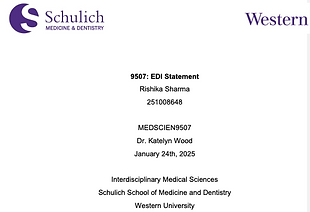Research Excellence Through Diversity
M.Sc Interdisciplinary Medical Science 9507
Course Description As Taken From Syllabus:
To solve complex medical problems in an increasingly global environment, the inclusion of diverse ideas, perspectives, and study populations is vital. In this block, students will learn foundational knowledge of what diversity means when applied to medical science research and why it is essential to strive towards equitable, diverse, and inclusive medical science. Implicit bias, diversity of research teams, and inclusion of diverse study populations will be explored in terms of implications for medical science excellence. Students will gain an understanding of practical approaches for how to engineer equitable, diverse, and inclusive medical science research and how to implement this in research groups and health research organizations.
Learning Objectives:
-
Develop knowledge on diversity and apply it to medical science research
-
Recognize how to strive toward equitable, diverse, and inclusive sciences
-
Critically evaluate the implications of implicit bias, diversity of research teams, and inclusion of diverse study populations on achieving excellence in research
-
Demonstrate knowledge of how to conduct equitable, diverse, and inclusive medical science research and how to implement this knowledge in research groups and organizations
Course Artifacts
These are some of the works I have produced in this course. Click on the button to view the entire project!

In this statement, I reflect deeply on my personal identity, privileges, and lived experiences, while analyzing how they have shaped my commitment to equity, diversity, and inclusion (EDI). I explore systemic barriers I have encountered or witnessed, and demonstrate an advanced understanding of EDI across research, academic, and community settings. I highlight actionable strategies I have implemented—and plan to expand—to foster inclusive environments, with a clear focus on measurable impact. This assignment allowed me to critically examine both the structural challenges and my own responsibility in advancing EDI in science and academia.

In this reflection, I engaged critically with the foundational distinctions between Western and Indigenous research methodologies, using a relational approach to explore my position as a researcher. I examined how Indigenous Research uniquely centres relational accountability, community knowledge, and holistic inquiry, while also acknowledging the systemic challenges researchers must consider when approaching Indigenous communities. This assignment deepened my awareness of the ethical responsibilities tied to positionality and allyship in academia, encouraging me to reflect on how I can meaningfully support Indigenous sovereignty in research spaces.
Reflection
Reflecting on the Research Excellence Through Diversity course, I recognize how it has profoundly shaped my understanding of equity, Indigenous research frameworks, and the systemic factors that influence who gets to participate in and benefit from scientific inquiry. Engaging with topics such as culturally safe research practices, systemic bias, and the ethical responsibilities of allied researchers has expanded my perspective on what inclusive and ethical research truly entails.
This course encouraged me to critically examine my own positionality as a researcher and consider how my identity, privileges, and lived experiences shape my approach to knowledge production. Learning about Indigenous methodologies and the importance of relational accountability has challenged me to move beyond extractive models of research and embrace approaches grounded in reciprocity, respect, and co-creation. These insights will continue to guide me as I strive to contribute to research environments that are not only rigorous, but also just, inclusive, and community-centered.
